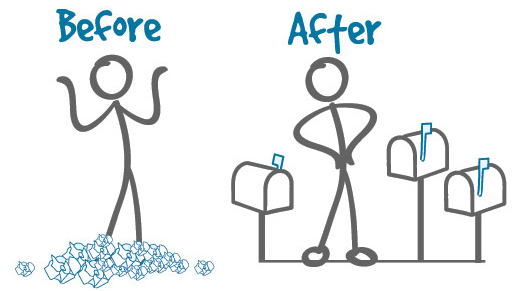Email (or e-mail, take your pick) is one of the triad of scourges of the modern work world, along with meetings and conference calls. How do you get better at email management, then?
There are approximately 1.5 trillion articles about this topic of email management on the Internet, and honestly — that number might be a bit low in the grand scheme of things. I’ve written about this before, too: for example, this lively little ditty on ‘Two Simple Ways To Stay On Top Of Your E-Mail.’
Here’s the basic place you should net out about email management, though:
- E-mail is predominantly a waste of time where people heap new stuff on your plate relative to your position in the hierarchy
- E-mail isn’t actually real work; it’s a way of talking about/around work
- E-mail is a major productivity killer
- Every stat you read about e-mail should make you want to self-immolate
Taking all that together, you should probably realize you need to get better at email management if you want to be a better, more productive employee — and honestly, at the end of a given job or career arc, hopefully more people are evaluating you on whether you were a productive employee as opposed to how nicely you fired off those reply all messages, right?
So if you now care about the fact that you need to get better at email management, here comes the fork: how do you do that?
Get better at email management: Be less beholden to email
Here’s a little personal story. Back in probably spring 2014, I was living in Minneapolis and finishing up grad school. I had no job lined up and it was a pretty stressful time. In previous contexts like that, I’d be on email and LinkedIn all day long chasing targets and leads and trying to drum something up. In reality, that accomplishes almost nothing for you — people respond to you on email when they can, and in most job searches they don’t respond to you. (Civility is mostly dead.) People barely check LinkedIn, so hunting peeps down there is one of the great modern networking myths that we all still buy into.
[Tweet “Better email management = more productivity. Good goal, yes?”]
Plus, I was depressed as hell being on email and LinkedIn all the time with essentially 0.001% ROI — so I decided to make a change.
Every day, I checked my e-mail twice. Once at about 8:35am, and once at about 5:15pm.
Sometimes on Fridays, I only did one check.
So in the course of a standard work week, I checked my e-mail 8-10 times, max.
I told some people this and they looked at me like I had two heads and one was speaking Chinese.
“But you were in a job search?!?! You need to respond immediately to recruiters!”
There’s a logic there, sure — but this made me happier and I still ended up getting a few job offers. (Now, unfortunately the one I took ended up leading to termination about 17 months later, but let’s gloss that over for now.)
So here’s the first trick: be less beholden to email in order to be better at email management.
There was just a study on email management with government workers, as detailed in Fast Company. It’s important to know they’re government workers because when these studies are done in Silicon Valley or with tech firms, they’re essentially meaningless. Guys and girls at tech firms typically already understand concepts around productivity and maximizing it — that’s why things like Slack, Trello, Basecamp, Asana, etc. have been developed by, well, tech firms. When you change the context, the results are more interesting.
13 employees went off e-mail for an entire week, and the results included — and this is conclusively and across-the-board:
- Walked around more (good!)
- Talked to co-workers more (good!)
- Task-switched less (good, because multi-tasking is a myth)
- Focused on their priorities and deep work more (good!)
- Showed a measurable reduction in stress (good!)
All that is positive, right? Here’s maybe the most amazing part.
A lot of the e-mail quitters were concerned that once their email management experiment was over, the worst part would be digging out their inbox. In fact, even that wasn’t so bad. And this one explanation will make you laugh:
Interviews with one subject, a lab scientist, highlight the fact that some emails may not be as urgent as the sender makes them seem. Before he gave up email, people would email him tasks that needed to be done stat! When his email was cut off, people simply stopped assigning him tasks. They didn’t phone or find him in person. They just stopped. The scientist said that in hindsight, he believes the tasks either weren’t very important, or that the senders had instead taken the initiative to find information they needed on their own.
I just fell down crying from laughing so hard.
Basically, you go off email and suddenly your co-workers are like “OMG, who do I lob pointless no-context deliverables at now?!?!?” And within 2-3 days, they’re like “OK, I’ll lob them at Jack … or I guess I could do them myself … naw….”
[Tweet “Most people are emailing you because they’re pretty lazy themselves.”]
Here’s everything you need to know about email management in one sentence:
People are most likely emailing you because they’re lazy as hell themselves; so when you detach from email, you will become more productive.
Now, of course, we get into the awkward question of all workplaces: it’s more important for most people to focus on quantity of work as opposed to quality, so what happens if email management is done right and quantity of work declines? What do people rush around bellowing about then?
Oh yea, meetings.
But hey — there’s even a way to do meetings more productively!
Any other thoughts on email management? Leave ’em.
